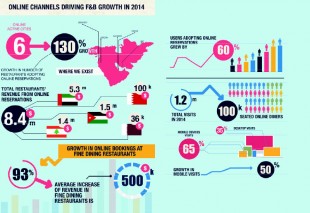

Trends in online reservations

ReserveOut co-founder and managing partner Khalil Shadid explains the online channels driving regional F&B growth, with an infographic created by the firm exclusively for Caterer Middle East
Online bookings are a fast-growing medium in the Middle East’s F&B market, and according to research by ReserveOut, there has been a 130% growth in the number of restaurants adopting online reservations from 2010 to 2014. This translates to a total of 320 restaurants across six cities — the UAE leads the way, with more than 50% of those being in Dubai.
Reserveout co-founder and managing partner Khalil Shadid said: “There are many factors in play that have caused the shift we are seeing today. The first is the shift in user/customer behaviour. Today, users are almost exclusively resorting to online channels to look up restaurants or discover a new dining experience.
Restaurants are finally grasping the importance of having presence online for the user to find them, but more importantly, to provide a seamless process for making the reservation online, without needing to break the cycle, look up a number, dial it, wait on hold, et cetera.”
He added that another important reason is related to user information gathering. “Restaurants can get more details about the user when they come online rather than just their name and number over the phone. There is a major shift in the restaurant industry today to provide tailored experiences, so the more they know, they better they can serve.”
Missed reservations is the third factor. In many cases, customers don’t book a restaurant due to the operating hours or being put on hold, which makes an online reservation platform easy to use.
“More than 40% of online reservations through the ReserveOut platform happen between the hours of midnight and noon,” Shadid revealed.
And the adoption is not restricted to casual brands or fine dining; indeed the latter is seeing a growth in online bookings and increase in average revenue, and Shadid said a big portion of the increase can be attributed to online reservations.
“Restaurants that receive reservations online have access to a wider network of users, can push promotions instantly, and fill up seats during dead periods by automating available times and extending special offers during these hours. Restaurants part of a group can capitalise on the structure and push traffic to sister restaurants when they are fully booked.”
So what’s next in this market? Shadid predicted: “Over the next two to three years we will continue to see a strong shift in user and business behaviour towards online channels and their use. More industries will follow suit in adopting online reservation channels and will come to depend on them for growth.